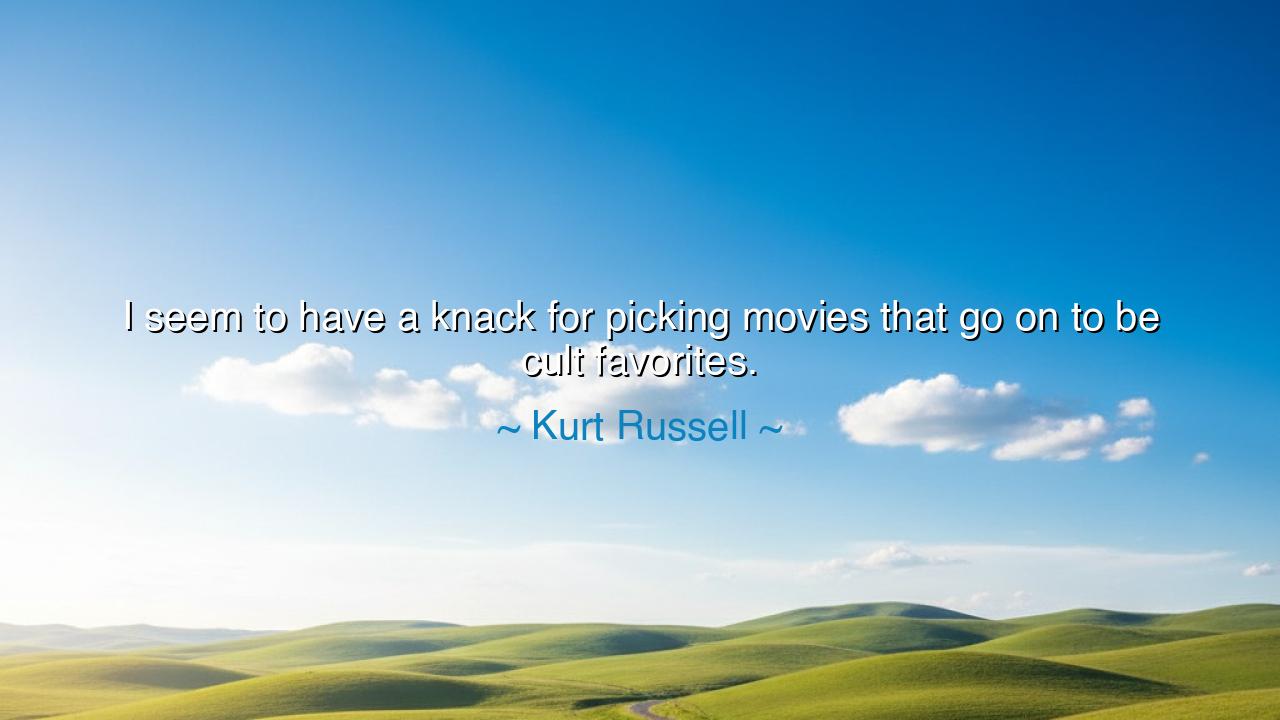
I seem to have a knack for picking movies that go on to be cult






Listen, children, for the words of those who walk the path of fate often contain lessons for us all. Kurt Russell, a man whose name has become synonymous with iconic roles, once said: "I seem to have a knack for picking movies that go on to be cult favorites." In this simple reflection lies a profound understanding of both chance and timing—how sometimes the decisions we make, though not always recognized in the moment, come to define us, and how what is ignored or unappreciated can later become the foundation of something far greater than we initially imagine.
In the ancient world, heroes were often shaped by fate in ways they did not fully understand at the time. Consider Odysseus, the great Greek hero, whose journey was fraught with danger and hardship. At first, many of his actions seemed to lead him further from home, further from glory. His wager to join the Trojan War did not immediately bear fruit; yet, over time, his wisdom and resilience would make him a hero of the ages. Similarly, Russell’s roles—often perceived as unconventional in the moment—have found their place in the hearts of many, earning them a legacy far beyond what was initially expected. The knack he speaks of is the ability to see what others do not, to choose the path less taken, and to embrace it with full conviction.
This idea is echoed in the story of Aristophanes, the ancient playwright whose comedies were not universally celebrated in his time. The Clouds, one of his most famous works, was initially met with scorn. It ridiculed the intellectuals of Athens, but only over time did it come to be appreciated as a sharp commentary on the state of Athenian society. Aristophanes, like Russell, may not have immediately recognized the long-term impact of his work, but his courage to defy conventional expectations and push boundaries eventually cemented his legacy. In the same way, Russell’s instinctive decisions to take roles in films that were initially dismissed would later prove prophetic—these films, just like the plays of Aristophanes, became cherished by those who saw the value others overlooked.
Consider also the story of Leonidas, the great Spartan king. When he and his 300 soldiers made their stand at the Battle of Thermopylae, many believed they were doomed. The world at large did not recognize the significance of their sacrifice until much later, when the story of their honor and bravery inspired countless others. The myth of Thermopylae grew, and eventually, Leonidas became a symbol of courage and sacrifice, far beyond the immediate context of his death. Russell’s quote echoes this timeless truth: that the most impactful decisions—whether they are personal choices or acts of valor—may not be recognized immediately but can grow into something larger over time. It is not always the immediate praise that defines us, but the lasting effect of our choices, often revealed only in retrospect.
The lesson here, children, is that greatness does not always announce itself in the moment. Sometimes, the decisions we make, the paths we walk, the roles we take on, may not seem important or revolutionary at first. But with patience and perseverance, they may come to define not only our legacy but also the cultural zeitgeist of a generation. Russell’s reflection reminds us that even the most seemingly small or unconventional choices can lead to great things. The path less traveled often holds the greatest surprises, and sometimes, the most unlikely decisions lead to cult favorites, just as Odysseus' journey led him to become one of the greatest heroes in Greek mythology.
Children, you too will find moments in your lives when the choices before you do not seem to have immediate significance. You may stand at the crossroads of your own journey, uncertain of which path to take. Remember, it is not always the obvious choice that leads to greatness. Trust your instincts and be willing to walk paths that may seem unconventional, for in them lies the potential for transformation—both for you and for the world around you. Like Russell, like Odysseus, like Aristophanes, you will find that the seemingly small or overlooked choices can shape the course of your destiny in ways that are only fully understood with time.
Finally, children, embrace the unpredictability of life. The movies we create, the stories we tell, and the choices we make today may not always be immediately recognized for their worth. But as the ancients knew, and as Russell so humbly reminds us, it is the journey—the belief in the value of what we do, even when others do not see it—that ultimately shapes who we are. Just as Leonidas’ courage became a lasting symbol, so too will your actions, when made with honor and conviction, resonate throughout time, far beyond what is visible in the present moment.






AAdministratorAdministrator
Welcome, honored guests. Please leave a comment, we will respond soon